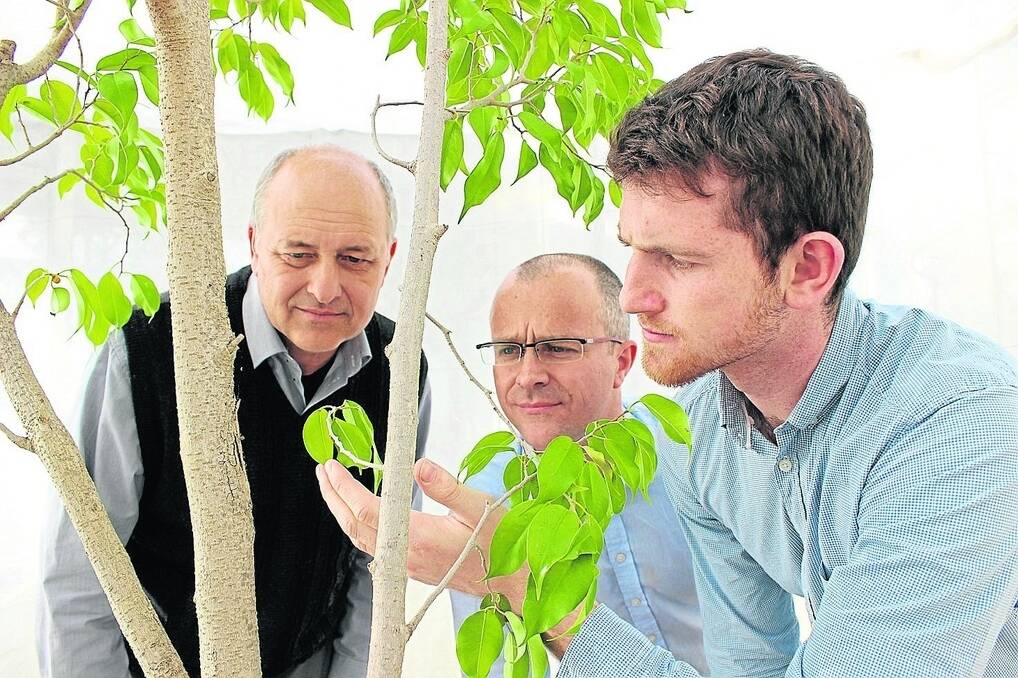
By MAL GILL
Subscribe now for unlimited access to all our agricultural news
across the nation
or signup to continue reading
GLASSHOUSE trials started last week in South Perth, of an imported, genetically modified, biological insect pest control with potential applications for fruit and vegetable growers and WA's livestock industry.
While the first-in-Australia Department of Agriculture and Food (DAFWA) trial is restricted to GM Mediterranean fruit fly, commonly known as medfly, the gene-engineering technique is being tested on other insect pests overseas.
United Kingdom biotechnology company and GM insect pest control pioneer Oxitec Ltd - spun out of Oxford University but now a stand-alone corporate entity - supplied DAFWA with 2000 GM medfly eggs in October.
Overseas, Oxitec is experimenting with gene engineering of diamondback moths - also known as cabbage moths - which attack brassica vegetables, forage crops and GM and non-GM canola varieties.
According to the Grains Research and Development Corporation, diamondback moth infestation can cause yield losses up to 80 per cent and outbreaks in Australia have been increasing for more than a decade due to rapidly developing insecticide resistance.
Oxitec is also testing a GM stable fly with the aim of ultimately breeding out the biting flies which can harry to distraction cattle and horses, and also harass pigs, dogs and humans.
Stable flies breed in damp straw - often used as bedding material for cows and calves under shade shelters in WA - and manure.
It is also working on GM insect biocontrols for a fly which infests olives and an Asian fly fruit pest, the Drosophila Suzukii, which has spread to Europe and North America in the past eight years and is proving resistant to insecticides.
Oxitec has also been working with the United States Department of Agriculture since 2006 on field trials of a GM pink bollworm in Arizona to control a cotton pest.
The technique involves a genetic modification to bring about a hereditary change and inserting a fluorescent protein genetic marker for traceability and to gauge effectiveness - similar to GM canola.
But instead of providing greater protection against disease and herbicides, as in GM canola, in insect pests gene engineering aims to cause breeding failure.
The technology stemmed from Oxitec's research into combatting the debilitating viral tropical disease Dengue fever which is transmitted by mosquitoes.
Last week Oxitec announced that from next month it will begin releasing 200,000 mostly male GM mosquitoes a week - up to a total of four million - in designated areas around the Cayman Islands to control mosquito populations.
In April it began community consultation with residents of the Florida Keys, in the US, ahead of a proposed GM mosquito release there.
Brazil's national biosafety group has also approved Oxitec's GM mosquito for release.
In Perth, Oxitec's GM medfly eggs have been bred by DAFWA into a secure colony of tiny adult flies.
Over the next few weeks glasshouse trials at DAFWA's headquarters will compare mating performance of the imported male GM medflies and local female medflies with that of local male and female flies.
Indirectly, the tests will also compare the GM male medfly against the current sterile insect technique (SIT) biological control.
For more than 25 years, DAFWA has headed medfly SIT in Australia, providing irradiated sterile medflies to control outbreaks in WA and South Australia.
But SIT technology has limitations.
Irradiating batches of male flies near the point of release to sterilise them carries health and safety risks.
As well, irradiating impairs the medfly's virility - limiting the distance it can fly to find females and successful matings - requiring greater numbers of sterilised males to be released to compete with wild males for females.
The GM medfly has potential to be a more effective disruption to the fly's breeding with significantly fewer numbers required, according to DAFWA's horticulture department director David Windsor.
The principle behind the GM medfly and the SIT medfly was essentially the same, but with a modified self-limiting gene replacing irradiation, Dr Windsor said last week.
"When these male flies mate, they pass on a specific gene to their offspring which prevents females from reaching reproductive age," he said.
"This means that the females cannot 'sting' or lay eggs in the fruit, or damage the fruit in any way.
"They also don't breed which dramatically reduces the fruit fly population."
Dr Windsor said medfly was a serious horticultural pest in WA, attacking a wide range of cultivated fruits and some fruiting vegetables such as capsicums and chillies.
It caused an estimated $10-$20 million damage to fruit crops annually, he said.
Oxitec research and development group leader Neil Morrison, who visited DAFWA for the glasshouse trial launch last week, said: "With our medfly, we hope to offer growers a powerful alternative to insecticides to protect their fruit crops in an environmentally sustainable way."
During the trials batches of 50 GM male medfly, 50 local male and 50 local female medfly are released into insect-screened tents over fruit trees in glasshouses at 30-minute intervals and the mating results observed, recorded and analysed.
The outcome of the trials will determine future research work.
Adult medflies can survive under ideal conditions for up to three months. Female medflies pierce the skin of fruit and lay their eggs under the skin and the larvae feed on the fruit after they hatch.


